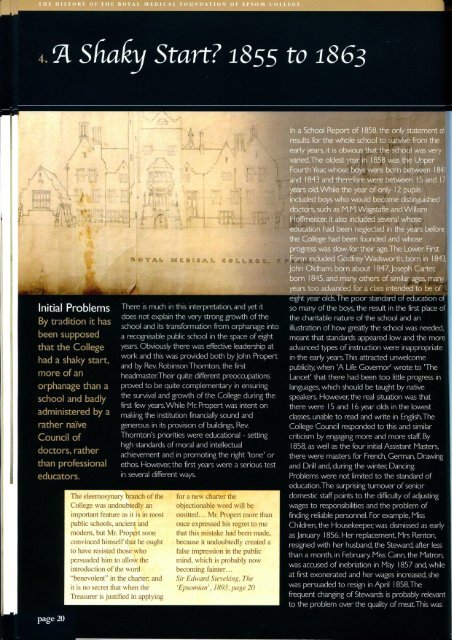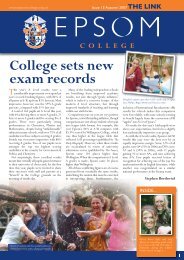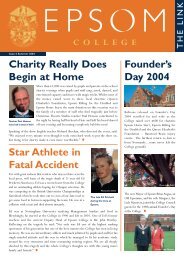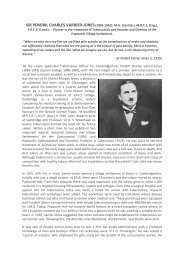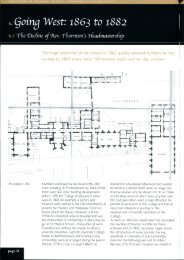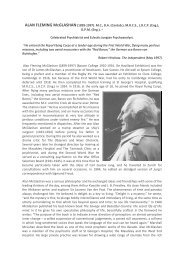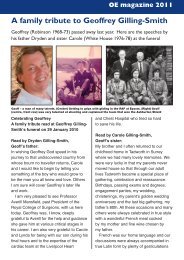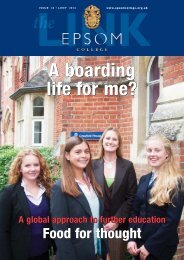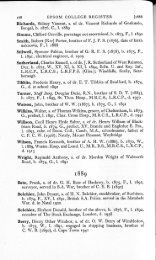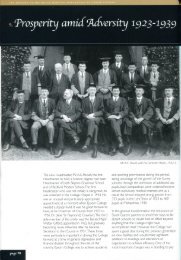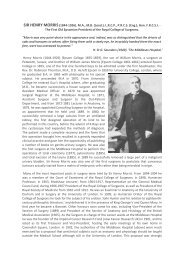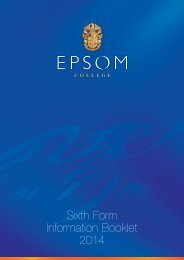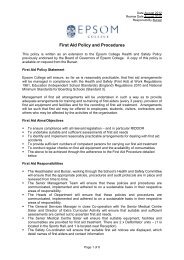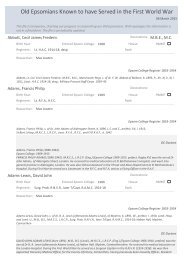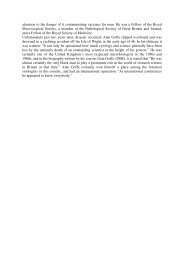The Infant School - Epsom College Archive Website
The Infant School - Epsom College Archive Website
The Infant School - Epsom College Archive Website
You also want an ePaper? Increase the reach of your titles
YUMPU automatically turns print PDFs into web optimized ePapers that Google loves.
Start? 1855 to 18 63<br />
Initial Problems<br />
By tradition it has<br />
been supposed<br />
that the <strong>College</strong><br />
had a shaky start,<br />
more of an<br />
orphanage than a<br />
school and badly<br />
administered by a<br />
rather naive<br />
Council of<br />
doctors, rather<br />
than professional<br />
educators.<br />
page 20<br />
<strong>The</strong> eleemosynary branch of the<br />
<strong>College</strong> was undoubtedly an<br />
important feature as it is in most<br />
public schools, ancient and<br />
modem, but Mr. Propert soon<br />
convinced himself that he ought<br />
to have resisted those who<br />
persuaded him to allow the<br />
introduction of the word<br />
"benevolent" in the charter; and<br />
it is no secret that when the<br />
Treasurer is justified in applying<br />
.<br />
Bfl E DIC A EL
first mentioned by the Council in October<br />
1856. Dr. Stilwell, the school Medical Officer,<br />
wrote in a newspaper article in I 857 that there<br />
was nothing in the complaints of one or two<br />
boys. In fact there followed a court case in<br />
1861, when Dr Stilwell accused the <strong>College</strong>'s<br />
butcher, MrThomas Humphrey, of causing<br />
illness among the boys as a result of the quality<br />
of his meat. According to the Surrey Standard,<br />
on 15th August, Dr Stillwell had said:<br />
" can stand this no longer; I will go and speak<br />
to Mr. Gibbs [the Steward]." He accordingly<br />
went and said, "I have had great complaints<br />
about the meat." His reply was, "I have been in<br />
public employ all my life and I have never seen<br />
such good meat served to public institutions."<br />
Defendant said, "<strong>The</strong>re must be some mistake,<br />
for the servants have complained and Mr<br />
Jenkins has complained," to which Mr Gibbs<br />
said, "Jenkin's son is a troublesome boy and we<br />
don't listen to what he says." Defendant then<br />
remarked, "I must tell you what I have heard,"<br />
and told him what Mr John Steel had said to<br />
him, "that the meat was exceedingly bad at the<br />
<strong>College</strong>, and that the butcher bought legs of<br />
mutton by the yard and that he was almost<br />
hooted from the market."<br />
<strong>The</strong> case turned on what was said and whether<br />
the butcher "bought mutton by the yard" or<br />
had been "hooted from the market". While it<br />
was found against Dr. Stilwell, the court<br />
awarded only two pounds damages, to make<br />
sure that the case could not be appealed.<strong>The</strong>ir<br />
sentiment was clearly that the doctor was right<br />
and that the meat was bad. Gibbs, the Steward,<br />
whose responsibility was the inspection of the<br />
meat, was sacked. It was perhaps unwise for the<br />
<strong>College</strong> Council to take tenders for the supply<br />
of commodities for a six month period, and to<br />
always choose the cheapest supplier, but the<br />
real position was that the <strong>College</strong> needed to<br />
run as cheaply as possible in order to afford<br />
the next step in development <strong>College</strong> supplies<br />
were expensive, compared with other schools,<br />
because of the distance from the metropolitan<br />
markets, while the institution was too large to<br />
be supplied just from <strong>Epsom</strong>.<br />
While there were many other minor difficulties<br />
in the first few years, none of these would be<br />
EDUCATION AT THE<br />
ROYAL MEDICAL<br />
BENEVOLENT COLLEGE<br />
To the Editor of THE LANCET<br />
SIR, -.. .1 must confess in limine<br />
to the weakness of not liking the<br />
word "Benevolent." I should<br />
rather not, except on strong<br />
inducement, send my boys to a<br />
place so patented and labelled as<br />
a charitable institution, and I<br />
suppose this to be so common a<br />
feeling that many others must<br />
think this with me. Eton is, in<br />
fact, a "benevolent" institution<br />
like our own <strong>College</strong>, so is<br />
Winchester, so is Charterhouse,<br />
and the Carthusians at the latter<br />
much resemble the decayed<br />
brethren we are proud to support<br />
at <strong>Epsom</strong>; so also is the<br />
Marlborough <strong>College</strong>, intended<br />
specially for the sons of<br />
clergymen, and so are many of<br />
the foundation and other schools<br />
throughout the kingdom; but it<br />
would a little grate upon the ear<br />
if they were called the Eton<br />
Benevolent <strong>College</strong>, the Charterhouse<br />
Benevolent <strong>School</strong>, and so<br />
forth. Why should not the word<br />
"Benevolent" be expunged from<br />
the title of the noble institution<br />
which Mr. Propert, aided by the<br />
zeal of the profession, has<br />
founded? It is not a true word, as<br />
regards the majority of the boys<br />
who are being educated in the<br />
school; and it must be distasteful<br />
to parents, as well as to those<br />
collegers who are old enough to<br />
mink at all of the matter.<br />
Furthermore, it is little calculated<br />
to add to the pride of the masters<br />
in being connected with the<br />
<strong>College</strong>. A good master would do<br />
his duty under one name as well<br />
as another, but it is only fair that<br />
the prestige of the heads of the<br />
school should be promoted as far<br />
in fairness as possible. Why,<br />
then, should it not be called the<br />
"Royal Medical <strong>College</strong>"?<br />
Surely the contributions of the<br />
profession would flow in quite as<br />
freely for its great and good<br />
purposes without the titular<br />
parade of charity, and its<br />
accompanying<br />
disadvantages.. .[<strong>The</strong> writer goes<br />
on to criticise short holidays,<br />
long hours, poor food and<br />
frequent floggings]<br />
Let the boys, I say in conclusion,<br />
have less work and more play; a<br />
better diet, and fewer floggings.<br />
I am. Sir, your obedient servant,<br />
January 1858<br />
PATERFAMILIAS<br />
.**..)_i£*~ " - ~ i ££ic u^r •".."•<br />
I MM Lf :«/,«;« »ki,f.( • f tb« : ,. wd* •<br />
la t be ;:>- '.^'""f<br />
• '••-•-. '•.,•' i ' i i • . : , . • - . i - . . . ' • ,._, ...,'..-•-<br />
•.• = ' . . - , . , ; . - , ;.,:,.;•.,•;.•.•;• - "<br />
"-• iaMtwwn. Mrf lMp|Mi tlm t* I.<br />
unusual in the creation of a large institution<br />
from nothing.<strong>The</strong> existence of the references in<br />
the Minutes of the <strong>College</strong> Council and in the<br />
medical press attests to the seriousness with<br />
which such complaints were taken, and the<br />
record suggests that they were quickly acted<br />
upon.<br />
•<br />
***• 1 •TouldM.<br />
:>:«. tbt MulMWM<br />
Kitttr. it »«M W<br />
-.-.. . : It.<br />
. ! , | -. -» .<br />
•,: :<br />
•;.<br />
I<br />
. .<br />
....,<br />
• ....<br />
.; . ..- '.<br />
.!•. .<br />
page 21
4.2 ife (jjreat Controversy<br />
-. <strong>The</strong> difficulties already mentioned<br />
were as nothing compared to the<br />
controversy over the price of<br />
education for doctors' sons, which<br />
pushed the <strong>College</strong> into constant<br />
reassessment and change during<br />
these years.<br />
<strong>The</strong> controversy was between a group of<br />
'dissentient governors', led by Mr Cattlin, and the<br />
<strong>College</strong> Council over whether the fees for<br />
'exhibitioners', or sons of medical men, should<br />
pay £30 per year as promised in the initial<br />
campaign for the <strong>College</strong>, or the real cost of<br />
education of £40 per year It began when, in<br />
1856, it was decided to increase the fees, in line<br />
with opinion about the meaning of the 1855<br />
Royal Medical Benevolent <strong>College</strong> Act, which had<br />
stipulated that fee payers could not be<br />
supported from the charity <strong>The</strong>re was an<br />
immediate outcry from doctor parents at the<br />
increase in fees, arguing that the new fees would<br />
be more than many poorer doctors could afford<br />
and that the Act, in calling sons of doctors<br />
'Exhibitioners' had intended that they should<br />
benefit from the charity, rather than just be fee<br />
payers.<strong>The</strong> Act had obviously been loosely<br />
worded and, over the next few years, legal<br />
opinion differed as to its exact meaning.<strong>The</strong><br />
<strong>College</strong> Council decided to view it conservatively<br />
and to make doctors pay the actual cost of their<br />
sons' education, reserving the benefit of the<br />
charity for the 40 orphan sons of doctors, known<br />
as 'Foundationers'.<strong>The</strong> aggrieved parents<br />
petitioned the Council for an Extraordinary<br />
General Meeting, which was held in June 1857.<br />
<strong>The</strong>y wanted complete disclosure of the<br />
accounts of the <strong>College</strong> and accused it of all<br />
sorts of inefficiency, suggesting that a similar<br />
education could be found elsewhere for as little<br />
as £25 per year In 857 Mr Cattlin published a<br />
critical report accusing the <strong>College</strong> of<br />
mismanagement and the misuse of funds. For the<br />
next few years the 'dissentient governors'<br />
promoted their own candidates for election to<br />
the <strong>College</strong> Council, many of whom were<br />
a mii<br />
Till: ROYAL<br />
ma.de 1-y Dr.
A SHAKY<br />
START<br />
t>>.<br />
KNT<br />
i<br />
i! ini.<br />
KM 1><br />
liich<br />
THE ROYAL MEDICAL BENEVOLENT COLLEGE<br />
To the Editor of THE LANCET<br />
SIR: - At a meeting of<br />
governors of the Royal<br />
Medical Benevolent<br />
<strong>College</strong>, held at my house,<br />
Oct29th, 1856, it was<br />
resolved that a courteous<br />
application be made to the<br />
Council for a minute<br />
account of the expenses of<br />
the <strong>College</strong> so far as they<br />
relate to the school for<br />
exhibitioners. Such<br />
application was made by<br />
Dr. C.Taylor, of Bethel<br />
Place. Camberwell, on<br />
behalf of the meeting, who<br />
undertook to defray any<br />
expense to which the<br />
<strong>College</strong> might be put in<br />
preparing the same. <strong>The</strong><br />
following is the reply<br />
received from the Council:<br />
[<strong>The</strong> Council had met and<br />
had declined to produce the<br />
figures, stating that the<br />
books were open to<br />
inspection by a Governor]<br />
It will be seen by Rule XL<br />
That any governor is<br />
entitled to inspect the<br />
books without licence from<br />
the Council, and it certainly<br />
appears most arbitrary to<br />
oblige medical practitioners<br />
to spend their valuable time<br />
in extracting accounts from<br />
books, which they might<br />
not understand, which<br />
ought to be freely rendered<br />
and which the secretary<br />
informed me he could<br />
prepare in the course of an<br />
hour. <strong>The</strong> governors now<br />
have no alternative but to<br />
call an extraordinary<br />
general meeting. <strong>The</strong><br />
following memorial has<br />
been prepared for that<br />
purpose, and all who desire<br />
to co-operate are requested<br />
to make copies of the same,<br />
have them signed in their<br />
respective neighbourhoods,<br />
and forward them...<br />
'• 3<br />
(COPY OF MEMORIAL)<br />
To the Council of the Royal<br />
Medical Benevolent<br />
<strong>College</strong><br />
We, the undersigned, being<br />
governors of the Royal<br />
Medical Benevolent<br />
<strong>College</strong>, request that you<br />
will convene an<br />
Extraordinary General<br />
Meeting of the governors<br />
of the institution, to reconsider<br />
the resolution<br />
relating to the increased<br />
charge for exhibitioners,<br />
passed at the meeting of<br />
Aug. llth, 1856, with a<br />
view to its being altogether<br />
rescinded or satisfactorily<br />
adjusted; and also to take<br />
into consideration the<br />
affairs of the <strong>College</strong><br />
generally, more particularly<br />
as to its working expenses<br />
and the further<br />
development of the<br />
educational department...<br />
elected. At every public meeting the dissentients<br />
were defeated by large majorities but, never<br />
satisfied, they grumbled on routinely accusing the<br />
Council, and John Propert, of bad faith.This had<br />
[ fe effects in lessening the impact of public<br />
i appeals for subscriptions and donations to the<br />
i <strong>College</strong> and, by the early 1860s, it was a powerful<br />
| force in making the Council open the school to<br />
non-medical parents, who would pay higher fees<br />
and fund reductions for doctors' sons, If the<br />
'dissentients' had won the day then educational<br />
standards at the school must have been reduced,<br />
plans for further development must have been<br />
postponed and the <strong>College</strong> would have been<br />
greatly harmed.
I<br />
4.2 Tfc <strong>Infant</strong> SchooC<br />
It is difficult to find out quite what the school was like in its early years.<br />
<strong>The</strong>re was no <strong>College</strong> magazine (the '<strong>Epsom</strong>ian' did not start until 1870)<br />
and nothing survives written by pupils in the first years.<br />
Certain insights are provided by the Minutes of the Council, or by<br />
the Scrapbooks. For example, there is an inventory of clothing<br />
from I 856, which shows just what articles parents must provide,<br />
but does not really describe them.<br />
Caps were ordered by the Committee of Council in 1856 (boys<br />
were issued them by the Drill Sergeant) but caps with tassels<br />
were provided for prefects.<strong>The</strong> same committee decided that<br />
quill pens should be used, and the pupils 'taught how to mend<br />
them'. Boys were not allowed outside the <strong>College</strong> grounds, unless<br />
accompanied by a master<strong>The</strong>y were confined to the playground,<br />
on the site of the present Quad, except on half holidays<br />
(Wednesday and Saturday) when they might take accompanied<br />
walks or play sport on the Cricket Field (now Chapel Pitch) in<br />
front. Hours of schooling were long, starting with prayers at 7.45<br />
am, followed by breakfast and school from 9.00 until midday. After<br />
dinner at I o'clock, lessons continued from 2.15 until 5 pm,<br />
followed by tea and a fourth session of school between 7.30 and<br />
8.30 pm. Bed time for the younger boys (eight or nine years old)<br />
was immediately after evening prayer; at 9.00 pm.the Upper<br />
<strong>School</strong> no later than 10.00 pm.<strong>The</strong>re was no 'prep' in those days,<br />
but lessons were actually taught in the evening. Most lessons were<br />
in the 'Great <strong>School</strong>room', the present Masters' Common Room,<br />
but there were three other classrooms, two at least on the Main<br />
Corridor immediately adjoining the schoolroom.<strong>The</strong> third has<br />
never been convincingly located but may have been further along<br />
the corridor Lessons consisted of 'Latin, Greek, English, French, and<br />
German, Writing, Arithmetic, Mathematics, and Natural Philosophy,<br />
History and Geography Music, the Scriptures and the Prayer<br />
Book' Occasional lectures were delivered on 'Literature and<br />
Science1, but the Headmaster remarked that these too often<br />
consisted of a lightning tour of the whole subject in the space of<br />
an hour rather than an organised progression of study. In 857<br />
instruments were bought to form a band. Rev.Thornton, who had<br />
read Maths as well as Classics at Oxford, was much more<br />
enthusiastic about the 'Physical Sciences' than one might have<br />
suspected from his own classical education and religious vocation.<br />
In 1858 he advocated a thorough, if voluntary, scheme for<br />
instruction in Science, which was quite outstanding for its time.<br />
Something must have been achieved since success in examination<br />
at Apothcaries Hall was quite marked from these early years.<br />
ROYAL MEDICAL BENEYOLC.I<br />
rrymrnt hi, hnhtr *,0rr m*dr i* ti.<br />
INVENTORY OF<br />
- — • - Jacket*<br />
3 —-_ : pairs of Trow.....<br />
'<br />
- Pairs of Shu..<br />
. Pair of U-ath<br />
~: Xifflit do.<br />
r.iir- of ttw UcNimUc >w<br />
»(a(r B." i-.-p.uV. »!i»il )•«• Hrot l-«k to hi. Hkt.-i.ti *iih.« one (atlnigbt<br />
in.m«iutriv bt rrpU»l. Atid if no tvittr* be nx«ivcd by I'weiil.<br />
rimicit Ilwt ilic h.i*n.
IGE, EPSOM.<br />
.. .Another step is the<br />
introduction of Physical<br />
Science among our school<br />
studies; not perhaps as<br />
compulsory, but (for the<br />
present at least) voluntary.<br />
To force upon unwilling<br />
boys the study of Physical<br />
Science, would simply<br />
retard their progress in<br />
other branches, but there<br />
are many who would look<br />
upon such an employment<br />
in the light of a recreation,<br />
and would be glad of the<br />
opportunity of spending<br />
part of their leisure in<br />
acquiring a knowledge<br />
which will prove at once a<br />
Headmaster's Report:<br />
To the President and Council of the Royal Medical Benevolent <strong>College</strong>. July 29th, 1858<br />
source of amusement and<br />
an advantage to them. To<br />
gain this end, the <strong>College</strong><br />
must be furnished with<br />
philosophical apparatus.<br />
We need in the first place a<br />
chemical laboratory. <strong>The</strong><br />
little room over the porch,<br />
now used as a box room,<br />
would do very well for the<br />
purpose: and should<br />
another box room be<br />
provided... it might be<br />
appropriated. It would be<br />
difficult for me to send you<br />
an estimate of the expense<br />
of fitting up a laboratory.<br />
<strong>The</strong> preferable plan, would,<br />
I think, be for you to<br />
empower me to expend, at<br />
my discretion, a certain<br />
sum; you might rely on its<br />
being laid out to the best<br />
advantage. To prepare and<br />
discuss an estimate would<br />
take a considerable time;<br />
but if empowered as I have<br />
suggested, I have little<br />
doubt I could get a class to<br />
work in a fortnight or three<br />
weeks from the<br />
commencement of next<br />
term. I should begin with<br />
the study of Chemistry: but<br />
we might in process of<br />
time, (when we get more<br />
room in the <strong>College</strong>,) form<br />
a small museum of<br />
Geology. Botany and<br />
Natural History in general.<br />
In addition to Chemistry, I<br />
wish to turn the minds of<br />
the pupils to the subject of<br />
Astronomy. A more<br />
agreeable and profitable<br />
employment for a winter's<br />
evening cannot be devised.<br />
I therefore recommend the<br />
purchase of a large<br />
telescope and stand, with a<br />
celestial globe, which I will<br />
take under my care, and<br />
will not fail to use for the<br />
benefit of the inmates of<br />
the <strong>College</strong>.<br />
At first there was no organised sport.<strong>The</strong>re is no formal record of the introduction<br />
of football. Our only authority is a memory from an OE, written for the '<strong>Epsom</strong>ian'<br />
of May 1883.This records that hockey had preceded it as the favourite winter sport,<br />
that it started in I 857 or I 858 and that the first matches were in I 864 or I 865.<br />
Football, as I knew it at<br />
<strong>Epsom</strong>, was played in a<br />
quite primitive method,<br />
much like the hockey of<br />
those days, which preceded<br />
it in public favour. We were<br />
ignorant alike of Rugby and<br />
Association principles, and<br />
we had no printed or<br />
written rules. As many of us<br />
played as wanted to - we<br />
were divided into two equal<br />
bodies by the process<br />
known as 'choosing sides,'<br />
and one or two each side<br />
were selected to act as goalkeeper.<br />
A fair catch entitled<br />
to a free kick, and we were<br />
generally satisfied with<br />
driving the ball under,<br />
instead of over, the bar. Nor<br />
do I believe that any<br />
alteration of this state of<br />
things took place until 1864<br />
or 1865, when Rugby Rules<br />
of modified type were<br />
adopted, and the matches<br />
were for the first time<br />
arranged with other schools<br />
and clubs, and the<br />
metropolitan hospitals. But<br />
to return to the first football.<br />
My readers will, 1 trust,<br />
excuse me if I leave them<br />
in doubt whether it arrived<br />
in 1857 or 1858. None of<br />
us seem to have conceived<br />
the idea of clubbing<br />
together and purchasing<br />
such a means of enjoyment,<br />
and the ball was not the<br />
outcome of any<br />
subscription of much<br />
begrudged pocket-money,<br />
but it was a formal gift to<br />
the school by a member of<br />
the <strong>College</strong> Council. <strong>The</strong><br />
day of its presentation was<br />
one to be marked with red<br />
in the annals of the <strong>College</strong>;<br />
and the ceremony itself was<br />
made as impressive as<br />
possible. <strong>The</strong> whole <strong>School</strong>,<br />
not quite so large as now,<br />
was drawn up to form three<br />
sides of a square, facing<br />
inwards, while the fourth<br />
side was incompletely<br />
represented by authority, in<br />
the shape of Members of<br />
the Council, the Head<br />
Master, Dr. Thornton, and<br />
others. A few kindly words<br />
were addressed to us, the<br />
usual cheering followed,<br />
and the ball, which was<br />
very small according to<br />
modern ideas, and<br />
moreover globular in shape,<br />
was handed over to one of<br />
the big boys. We "stood<br />
easy", we "broke", and then<br />
we went for the ball. <strong>The</strong>re<br />
was no question of forming<br />
sides, or of having a<br />
properly constituted game,<br />
but the whole school was<br />
mad for a kick at the<br />
unoffending sphere. Once it<br />
was started we rushed after<br />
it in a body, the big boys in<br />
a dense mass ahead, and<br />
behind them small, smaller<br />
and smallest, in a gradually<br />
widening and thinning<br />
formation, much like the<br />
trail of the great comet<br />
which excited our boyish<br />
wonder about that time. I<br />
don't know how it<br />
happened, whether the<br />
constitution of the ball was<br />
faulty, whether it ran<br />
unconsciously against a<br />
sharp piece of wood in the<br />
spinney, or was<br />
inadvertently stamped upon<br />
by one of the heavier<br />
weights, but the fact<br />
remains that within a very<br />
few minutes at the outside<br />
that ball was a collapsed,<br />
shrivelled, squashed mess,<br />
like the Normandy pippin<br />
of the English market...<br />
(<strong>The</strong> <strong>Epsom</strong>ian, May 1883)<br />
page 25
O 1 I H 1 ROY A 1<br />
-<br />
4.2 Tfe infant Scfioof<br />
fEvsom Coffege<br />
Sept 16.62<br />
Dear Sir,<br />
1 fiave the pleasure to inform<br />
you that at a meeting of the<br />
cricket chid this evening, it was<br />
proposed" and carried<br />
unanimously to take this<br />
opportunity outflanking you<br />
most cordiaffy for your kind<br />
interest and trouble bestcnved on<br />
the ground and the c£u£> in<br />
general 'ACC of us join in hoping<br />
that you witt again, during the<br />
coming season, take the same<br />
trouble in promoting the<br />
cricketing interests of the Coffege,<br />
which we feet sure, would sadty<br />
faff off, if deprived of the<br />
advantage of your care and<br />
patronage; ^ havepfeasure of<br />
remaining, on faenaifof'the chtfa,<br />
Yours sincerely<br />
T.'A.OCdaker, rfon. Secy,<br />
fEC.CC.<br />
Accompanying it is a photograph,<br />
presumably of the side of that year,<br />
with bowler hats and striped shirts,<br />
accompanied by Mr Jeffery<br />
page 26<br />
Cricket was probably introduced at about the same time.<br />
As early as 856 Dr. Stilwell was appealing for funds to<br />
create a cricket ground.<strong>The</strong> <strong>College</strong> Council gave £ 5, but<br />
other donations were still being sought the year after In<br />
1859 an area on the present golf course was hired from<br />
the Lord of the Manor, which continued as the main<br />
cricket ground for many years. By the early 860s<br />
matches were probably being played.<strong>The</strong>re exists a<br />
delightful letter from the Hon. Secretary of the <strong>Epsom</strong><br />
<strong>College</strong> Cricket Club, thanking a master, Mr James Jeffery,<br />
for his efforts for the club.<br />
<strong>The</strong>re was a covered playground on<br />
the site of the present cricket nets,<br />
close to the Chapel.This included<br />
toilets and a fives court, which<br />
survived until the present courts were<br />
built in the 1890s and long after the<br />
covered playground had been<br />
demolished. With this was a 'giant's<br />
stride1, a long pole with a rope<br />
attached, that the younger boys could<br />
swing around on. More formally,<br />
physical instruction was taken under<br />
the direction of Colour Sergeant<br />
Cough, once of the Royal Marines,<br />
who taught drill, gymnastics and
PROGRAMME OF THE ARRANGEMENTS<br />
TO BK OBSERVED AT THE<br />
OPENING OF THE CHAPEL<br />
ROYAL MEDICAL BENEVOLENT COLLEGE, EPSOM,<br />
On TUESDAY, J0LY llth,1857.<br />
fencing and kept order in the playground and<br />
lunch queue.<br />
Most pupils boarded, though it is surprising to<br />
find that there were always day pupils. While<br />
'Exhibitioners' paid £40 per year to board, day<br />
pupils paid only £ 15, £ 12 in the Lower <strong>School</strong>.<br />
Boarding accommodation was more and more<br />
crowded. In 860, for example, there were 39<br />
boys crowded into the four main rooms of the<br />
Warden's House (part of the present Cafeteria<br />
and the accommodation above).Though masters<br />
slept nearby, it must have been difficult to<br />
maintain order after lights out. In 1858, Rev.<br />
Thornton was keen to have a 'Dame's house'<br />
erected near the <strong>College</strong> to relieve the situation<br />
and, in fact, a Mrs Inverarity of South Street<br />
began to take in pupils, who boarded with her<br />
and were educated at day rates at the <strong>College</strong>.<br />
This was not always an easy relationship, since<br />
Mrs. Inverarity tended to blame the <strong>College</strong> for<br />
difficulties occurring on the other side of <strong>Epsom</strong>.<br />
in 1859, Rev. Frederick Pentreath, the Second<br />
Master; began to lodge with her to maintain<br />
order and soon took over the house, continuing<br />
until he retired in 1862.This was the first of the<br />
embryo houses that continued to have a<br />
shadowy existence for many years and it was<br />
the prototype for Wilson, built ten years later<br />
An important part of the <strong>College</strong> was its<br />
Chapel, opened in 1857 with the by now usual<br />
fanfare of press coverage and attendant crowds.<br />
By now the Exhibitioner controversy was at its<br />
height and support was rather less than<br />
expected, an indication is that staffing was<br />
reduced from four mounted police, eight<br />
ordinary constables and three detectives from<br />
Scotland Yard to just five constables and one<br />
detective. An Organist had been hired, the first<br />
Music Master at the <strong>College</strong>, and the band of<br />
the Royal Horse Guards was engaged.<br />
<strong>The</strong>re were difficulties in gaining the right to<br />
celebrate Holy Communion, which was closely<br />
guarded by the Vicar of <strong>Epsom</strong>. Despite the<br />
intervention of the Bishop of Winchester an<br />
arrangement could not be achieved. For the first<br />
few years the Vicar exchanged with Rev,<br />
Thornton, when Communion was to be<br />
celebrated at the <strong>College</strong>, to the inconvenience<br />
of both. Morning Prayers were held daily in the<br />
Chapel from<br />
1857 and it was<br />
soon embellished<br />
with stained glass.<br />
<strong>The</strong> East<br />
Window was<br />
given by the<br />
Honorary Local<br />
Secretaries, who<br />
had so greatly<br />
helped the raising<br />
of funds for the<br />
<strong>College</strong>.<strong>The</strong><br />
West window<br />
was given in<br />
1862, after a<br />
subscription was<br />
raised among the<br />
boys in memory<br />
of Prince Albert,<br />
who died in that<br />
year Curiously it<br />
was made by<br />
one of the boys,<br />
Francis Oldaker<br />
<strong>The</strong> special train will leave London Bridge Station nt fen o'clock precisely. <strong>The</strong><br />
fares will be the same as by the ordinary trains.<br />
No person ran be admitted to any part of the <strong>College</strong> Grounds or Buildings,<br />
without a ticket.<br />
Holders of pink tickets only will Ix; admitted to the Collew buildings prior to the<br />
opening of the Chapel, half of the tickets to be retained by the holders, and given up on<br />
entering the ChapeL<br />
Ladies who have subscribed Fire guineas to the funds of the Chapel, will !>c<br />
provided with sealed tickets, and will meet in a room specially provided for them.<br />
<strong>The</strong> Council, Honorary Local Secretaries, and other holders of pink tickets, will<br />
assemble in the <strong>School</strong>-room.<br />
At eleven o'clock, the Boys of the <strong>School</strong> will be drawn up by the Drill Master in<br />
front of the Entrance-porch.<br />
<strong>The</strong> procession will then bo formed in the following order:<br />
<strong>The</strong> Drill Master.<br />
<strong>The</strong> Boys forming the Choir.<br />
<strong>The</strong> rest of the <strong>School</strong>.<br />
<strong>The</strong> Masters of the <strong>School</strong>.<br />
<strong>The</strong> QlHciatimr Clergymen in Holies.<br />
<strong>The</strong> Kight Rev. the Lord Bishop of Winchester.<br />
<strong>The</strong> Ladies who have contributed to the Chapel Fund.<br />
<strong>The</strong> Honorary Local Secretaries.<br />
<strong>The</strong> night Hon. <strong>The</strong> Earl Manvers, President of the <strong>College</strong>, and Friends.<br />
<strong>The</strong> Treasurer and Friends.<br />
<strong>The</strong> Council of the <strong>College</strong>.<br />
<strong>The</strong> Pensioners.<br />
<strong>The</strong> Steward.<br />
<strong>The</strong> Service will be the ordinary daily Service; the Chaunts as under:<br />
Venite and Psalms . . . Rogcri, in O,<br />
Te Deum . . . . Soycf, in ]>.<br />
Jubilate . . . . . Unity, in F.<br />
Anthem, " O, how amiable!" (Psalm Si) MiclMrdttm.<br />
llymn," Come ye people," . . Anon.<br />
At the conclusion of the Service the procession will form as before, and march to the <strong>School</strong>room,<br />
where the prizes will be distributed, and speeches recited.<br />
<strong>The</strong> Dfjedner will be at 3 o'clock in the Dining-hall. Tickets, which can be obtained nt<br />
the Office, in Soho Square, price }iino shillings, must be taken prior to the 7th July.<br />
After the D^je&iter a selection of glees will be performed by the Boys in the <strong>School</strong>-room.<br />
,-„,,„ ^o^*„„,»,,*„„<br />
Other windows<br />
commemorated Mr Robert Forest, who had<br />
established the Forest Scholarship with a bequest<br />
of £5,000 to help boys through university A further<br />
window was presented in memory of Mr Sterry a<br />
Member of Council, who also left money for a<br />
Divinity Prize.<strong>The</strong>se last two windows still exist in<br />
the present Chapel.<br />
<strong>The</strong>se first few years reflected institutional life in<br />
many different ways. One area of the corporate life<br />
of an institution such as the <strong>College</strong> is its reaction<br />
to disaster<strong>The</strong> first mention of sickness in the<br />
<strong>College</strong> was occasioned by the sudden death of<br />
William Clothier of heart disease in June 1856.<br />
<strong>The</strong>re followed epidemics of Ringworm in 1857,<br />
Scarlatina in 858 and even a case of suspected<br />
Typhus among the Pensioners. Henri Giraud, died,<br />
aged Kin 1858 and in 859, Alexander Curling<br />
died, drowning in the Mole under Box Hill, while<br />
on a school outing.<strong>The</strong> <strong>College</strong> already had its<br />
own sick room, staffed by the Matron and a hired<br />
nurse when needed.<strong>The</strong>re was constant<br />
attendance from a Medical Officer; and a Hon.<br />
Attending Surgeon was added by 860. Such<br />
tragedies were part of the life of those days.<br />
page 27
\ M I 1) I I A I<br />
<strong>The</strong>re is no doubt that the first year or two of the <strong>College</strong> were difficult ones,<br />
and yet they were the foundation of success.<strong>The</strong> very disparate group of boys,<br />
brought together as much through need as from their wish to be at the<br />
<strong>College</strong> took a short while to turn into a school with 'spirit'. By 1858 Rev.<br />
Thornton was reporting how pleased he was with the discipline of the school.<br />
...<strong>The</strong> boys have been<br />
singularly healthy during<br />
the past term. <strong>The</strong>ir<br />
appearance struck<br />
everyone who was<br />
Headmaster's Report:<br />
July 29th, 1858<br />
(June 30th); and that not<br />
only as regards their<br />
happy and healthy looks,<br />
but their generally<br />
gentlemanly demeanour. I<br />
noticing their<br />
improvement; and when I<br />
consider the very rough<br />
material with which I<br />
have had to deal, and the<br />
to contend against, I<br />
cannot but feel thankful at<br />
the result of the labour<br />
which my coadjutors and<br />
myself have bestowed<br />
present on Founders Day, cannot help myself evil influences I have had upon our charge.<br />
page 28<br />
SriSll; ^sS^Sf^JSSSS'i<br />
M.A.<br />
ii, tl».<br />
unit «nW. and »ith coiwidmddc furir, ' I'" :"<br />
pvcucni*»f Hac..<br />
:.'.:•• "isi, . } T !- '•.': • ' i - , '*ill: !:.lniatk-*nd<br />
other i«-rf»rnisui>-«. in tlw Kntram*<br />
IW!, ui«fcr itw diiwtijnnr W. i:. L.nl,-*->.,!,<br />
, .<br />
wh. .>iiuint-d i(iTit.iiwi.« to join in tlie Colbw<br />
, ..-<br />
.<br />
.. ...[ ,.• i! • c ". „•. , ;„-• :i -,-•. - ,•!.-<br />
iwi.-d br * WiUunt .l|.[>Uv .< fir, » .»: V tha** » l« *, re oh»<<br />
M !:*«'], tut *->,•.! U-lh*t- *U.j w^:, •!.,,};( :i,iin<br />
„.:• 4- •, l!L,;r-( :L.-; r i,m ; «!:!. t! L-<br />
Wi«at of ft U*nti;ul hn-l»li..Mi; *lt«r whx>h,<br />
;,/ ,.Li ; ,i ->',.; -,.-,;•. MI. , - -. -;:- i. .•• •, -<br />
(jr.iju-l' *-.n- .'. ir,-!. s . . %••• Ihi,- «,-,• s;,,.<br />
.Hi llh . M,. .1!, ..! •',.- -: .» '{', .1 Ii i ''r-x.. -i,'<br />
,.; J !•, .1 il •/ :: • • :•!>• - • • \ -...<br />
,-,„ i ,!l;[;,;. ,: .*);• - • ... .% I-L. v ...<br />
AVDTHE* AfnlDtT. — t"*H l.vciull uf t!i,-<br />
c*fcU»tionor lU- >irt*.tvof Ii.k.rnwnn. mi.Kp-<br />
*.y • .),*-<br />
Ut"*) » tit.ii*r: *nd *l«-n the jirudiwor lu.t<br />
l«k»l i c-kc in * prntUnun'j tut, liroiUrlv<br />
otBmd, and lt >iu) tlM! Umi!. . hid ' TOJ<br />
! i t<br />
,., i.i.Aw'Li.N^l.f- i . . . - . .<br />
U,irti«] .* UK- pupil, took p*rl, wJ tlul «i.1«<br />
,, .; ;. r .' : • .." - •. A tr. !. r, !.,!!< ;.• .;'-.r-.' ii-.-i<br />
i; >,,- :.. i ,i i .! i l iii !' i •'. --• :.;r 'j-i.h . • u-i.<br />
moipowd M it *» i.'t nuny wicgm-loMdl o*<br />
wool *ndfum, it a BuB>AtlT Ufbkd ap UiU<br />
«ti-l Jdv. »-i,I «u 11* pnJate to » diiplay .,f<br />
-,. ...--.. .•! . •...•:•,,< .y Mr. i: i':- A-'-, r.<br />
oH*. DMIMXHW. rockett, fl7i»f-piBr,«», »hwU<br />
!- -..- ii . .!,\ -.,> r. f ; . , . TI. . - ,:• S<br />
•' si • ' . C.i... ;•: U.. ,.-!! . -'. t, ! ;"• i<br />
gmn-ROt MnlUit« the hmnbkr ^ulbi *ttd<br />
crmckm kt off by |«rtleoMi.Tl«tuT« »1 »*e<br />
papik. flfund in thU pattta of il* mcmuri<br />
CYtuinit'i wittrtJintih-ut: u»l the OiuUe (<br />
-a 1') it * vari. ,..t!,-l nvket, whk-lt<br />
*«li,-w,-,UTlr dirrctiun, «rai loaf rein<br />
ii«ht. Sot lr- thtn in) ptrwn.<br />
hu, in'., L it ••• - . .s :;..-' >!i -• i v in-<br />
..!!; »:i..-' ;i..' ?; .;> i ;>- r 'iy-_-;.us: ;..:•' -<br />
otUblUhneat »M eo^rfriri/ till-.! »n!i HWA.<br />
iurvd «t«r;np<br />
In the same report he was relating<br />
the success of pupils, six boys<br />
passing the preliminary examination<br />
at Apothecaries Hall in additioo^to<br />
the three, who had passed earlier in<br />
the year <strong>The</strong>se first successes were<br />
to be built upon in the future, 12<br />
boys being successful in the Royal<br />
<strong>College</strong> of Surgeon's preliminary<br />
exam in 1862 in addition to three<br />
matriculating at London University.<br />
That the Headmaster was<br />
interested in far more than<br />
academic success can be seen in the<br />
way he insisted on a high 'tone'. In<br />
859 he had successfully insisted<br />
upon high intellectual, moral and<br />
physical standards for candidates to<br />
the school. Perhaps the growth of<br />
cricket, football and other sports<br />
helped to instil standards of<br />
teamwork and moral conduct.<br />
Certainly, on Founder's Day 1860,<br />
Rev.Thornton was speaking of<br />
muscular Christianity and promising<br />
a Rifle Corps. Discussions on this in<br />
the <strong>College</strong> Council dragged on for<br />
two years, a sub-Committee being<br />
appointed to consider it, the<br />
support coming from the boys and<br />
the Headmaster but finally it was<br />
postponed indefinitely. By 1862 the<br />
Headmaster was advocating cricket<br />
as the creator of 'tone' and later<br />
that same year of 'tone1 and<br />
gymnastics.<strong>The</strong> whole environment<br />
of the school was calculated to<br />
seclude boys from unpleasant<br />
influences (the locked gates and<br />
supervision, the prohibition of boys<br />
speaking to the Pensioners) to<br />
exclude those of non-professional<br />
classes (the decision of the<br />
Educational Committee in April<br />
1857) while housing the boys in<br />
buildings that spoke clearly of the<br />
medieval chivalry associated with<br />
the novels of Sir Walter Scott and<br />
of patriotism. An inspection of the<br />
carved arch-springs in the <strong>College</strong><br />
Dining Hall (now Main Hall) will<br />
show a symbol for each of the<br />
countries of Great Britain.
<strong>The</strong> gothic theme was to be continued in the<br />
buildings of 862 and 863 and into the 870s<br />
as an expression of deeply conservative and<br />
patriotic values.That this related to the <strong>College</strong><br />
Council's wishes for the values it wanted to be<br />
taught cannot be in doubt. <strong>College</strong> boys would<br />
read Malory and Scott, Shakespeare and possibly<br />
Kenelm Digby's <strong>The</strong> Broadstone of Honour',<br />
that they would be true patriots and chivalrous<br />
knights worked well with the clear intention to<br />
educate boys for medicine, a more selfless<br />
vocation than most.<br />
Arch-spring in Main Hall<br />
<strong>The</strong> Main Staircase<br />
<strong>The</strong> Sterry Memorial Window by Francis Oldaker<br />
jase 29
4.4 Change and (jjrowth<br />
A most difficult problem was the limitation of the benefits of the <strong>College</strong>.<br />
Only 20 Pensioners had been housed in the <strong>College</strong> by I860, rather than<br />
the 100 first promised.<br />
Pressure on the school was intense, with 100<br />
boys projected in 855, it had already grown to<br />
150 without any new accommodation. Forty boys<br />
were on the Foundation, but in 1860 only four<br />
places would be free to be filled by election. In<br />
addition, in 861, came a report by Dr Aldis,<br />
which so greatly irritated the Council that they<br />
refused to receive it. He told them about the<br />
inadequacy of some of the <strong>College</strong> facilities in a<br />
very public way when the Council was more than<br />
aware of the problems.<br />
page 30<br />
<strong>The</strong> Council of the Royal<br />
Medical Benevolent<br />
<strong>College</strong> appear to have<br />
fared neither better nor<br />
worse than other people do<br />
in their choice of an<br />
architect and in the<br />
adaptation of their building<br />
to the wants and health of<br />
the inmates. No building of<br />
the size is ever reared<br />
without some sanitary<br />
defect, nor do we suppose<br />
that things will be<br />
otherwise till the entire<br />
subject of drainage,<br />
ventilation, light, space and<br />
other appliances for health,<br />
are thought equally<br />
important with a<br />
picturesque site and<br />
architectural<br />
embellishments. It is not<br />
surprising, therefore, that<br />
complaints have been<br />
raised as to the healthiness<br />
of the <strong>College</strong>, that the<br />
question of drainage seems<br />
to have been postponed till<br />
rather a late date in the<br />
arrangements, and that the<br />
system of cesspools<br />
provided at first should<br />
have required alteration,<br />
Medical Journal<br />
which was, as we are<br />
informed, effected by the<br />
well-known engineer Mr.<br />
Bazalgette. But, as we learn<br />
from statements which<br />
have been submitted to us,<br />
the <strong>College</strong> was still<br />
considered capable of<br />
improvement in a sanitary<br />
sense. One parent, at least,<br />
wrote to the Managers, and<br />
was by no means<br />
comforted by an assurance<br />
he received from the<br />
venerable President, that<br />
"fifty years' experience had<br />
convinced him that there<br />
was no connexion between<br />
cesspools and disease." At<br />
last, on the occurrence of a<br />
second (or third?) outbreak<br />
of scarlatina, one or more<br />
members of the Managing<br />
Committee invited Dr.<br />
Aldis to visit and inspect<br />
the <strong>College</strong>, and give a<br />
report on its present state,<br />
with suggestions (if any)<br />
for its improvement. Dr.<br />
Aldis accordingly<br />
accompanied the Visiting<br />
Committee in an inspection<br />
on March 12, and sent in a<br />
report, which now lies<br />
April 6th. 1861<br />
before us, and of which the<br />
pith is this...<br />
<strong>The</strong> disease, therefore, did<br />
not originate in the <strong>College</strong>,<br />
but "there are<br />
circumstances," says Dr.<br />
Aldis. "connected with the<br />
construction of the building<br />
which would favour the<br />
spreading of any epidemic<br />
when once admitted." <strong>The</strong><br />
accommodation for the sick<br />
is insufficient, and a sick<br />
ward, or infirmary, is<br />
necessary. Some of the<br />
boys' bedrooms in the<br />
Warden's house are dirty,<br />
and require the paper to be<br />
stripped off and paint or<br />
colour substituted, as<br />
cleaner, and less liable to<br />
harbour vermin. <strong>The</strong><br />
ventilation should be<br />
improved by providing<br />
channels for the entrance of<br />
air, and an Arnott's valve<br />
for its exit. <strong>The</strong> dormitories<br />
in the <strong>College</strong> are clean and<br />
in good order, except that<br />
the ventilation in two of<br />
them might be improved,<br />
and in none should<br />
bedsteads be placed before<br />
the fireplaces, so as to<br />
hinder the current of air.<br />
<strong>The</strong> schoolroom is utterly<br />
inadequate for the wants of<br />
the scholars, there being<br />
not more than 200 cubic<br />
feet of space for each boy,<br />
according to the data<br />
furnished by the architect,<br />
Mr. Elkington. "On<br />
entering the room," says<br />
Dr. Aldis, "I perceived a<br />
most nauseating acid smell,<br />
which always occurs in<br />
overcrowded dwellings and<br />
is favourable to the origin<br />
and spreading of zymotic<br />
disease. When we consider<br />
that so many human beings<br />
are confined within this<br />
limited space several hours<br />
of the day, and that many<br />
of them sit there from<br />
seven until nine in the<br />
evenings at their lessons,<br />
inhaling the pestilential air<br />
combined with the products<br />
of combustion of twelve<br />
gas lights, it is only<br />
surprising that some severe<br />
malady has not appeared<br />
sooner..."<br />
Medical Journal, April 6th,<br />
1861
In fact, the <strong>College</strong> had borrowed £7,000 in<br />
1858 to help them to increase pensions and<br />
allow more boys on the Foundation.This would<br />
not be paid off until 1861, Meanwhile the<br />
pressing need for more accommodation had<br />
become evident and an appeal had been begun<br />
in I 859, while the Council was still trying to<br />
remedy the defects in the first buildings.<br />
Chimneys were now unstable and windows let<br />
in drafts. Indeed so many complaints were<br />
made that the architect, Edward Clifton, had<br />
resigned in 1859.<strong>The</strong> position of the <strong>College</strong>,<br />
exposed to the winds of the North Downs,<br />
had made worse the problem of poor quality<br />
materials resulting from the constant effort of<br />
the <strong>College</strong> Council to stretch their resources<br />
to the limit But the famous Mr Bazalgette had<br />
been called in to diagnose the problem of<br />
drains in 858, George Elkington succeeded<br />
Clifton as Architect in 859 and the buildings<br />
were gradually put right<br />
Financially the <strong>College</strong> was still in trouble. In<br />
1862 a report by Mr Ward, a Member of the<br />
Council, had pointed out that, if plans to extend<br />
went ahead, the implications for the financial<br />
soundness of the <strong>College</strong> would be very<br />
worrying. Since so many were on the<br />
Foundation and the others were educated at<br />
no profit, the <strong>College</strong>'s responsibilities would<br />
rise beyond their ability to finance them.<strong>The</strong><br />
only way out was suggested again by the<br />
headmaster in a report advocating that many of<br />
the extra places created by expansion should<br />
be given to boys of non-medical parents, who<br />
j should pay more.<br />
Thus the fees for 'Exhibitioners' could be<br />
lowered and 'Foundationers' could be<br />
increased.Though this scheme took some time<br />
to come into operation, it was put into effect<br />
ensuring the future of the <strong>College</strong> but at the<br />
cost of reducing its 'medical' nature.<br />
Victoria contributed towards the new Albert<br />
Memorial Wing, the foundation of which was<br />
laid by John Propert in I 862 (now part of<br />
White House), Meanwhile a new schoolroom,<br />
capable of accommodating 300 pupils had been<br />
opened (Big <strong>School</strong>) in time for Michaelmas<br />
Term I 862, complete with an additional range<br />
of classrooms and a sitting room for masters.<br />
This makes up the ground floor of the present<br />
English Department, to which a first floor was<br />
later added. Additional dormitories would soon<br />
follow on the first floor of a new wing (above<br />
the present Common Room Dining Room and<br />
IT Department).<br />
<strong>The</strong> first mention of the name '<strong>Epsom</strong> <strong>College</strong>'<br />
that can be found at present is on the cover of<br />
the Headmaster's Report to the Counci in<br />
858. Before that the name is the 'Royal<br />
Medical Benevolent <strong>College</strong>' on in one instance<br />
only, <strong>The</strong> <strong>College</strong>, <strong>Epsom</strong>'.<strong>The</strong> change of name<br />
would stee upon the <strong>College</strong> slowly, being<br />
suggested openly in I 862 as a necessary<br />
change to attract fee-paying non-medical<br />
parents but not becoming 'official' for another<br />
50 years. More and more the school called<br />
itself '<strong>Epsom</strong> <strong>College</strong>', while the governing<br />
body, the Counci, remained 'Benevolent'.<br />
In this first few years the <strong>College</strong> had grown<br />
from an orphanage into a recognisable Publicc<br />
<strong>School</strong>. It had reinvented its buildings, had<br />
doubled its pupils, had doubled its<br />
Foundationers and had overtaken the Asylum<br />
as the major partner on the <strong>College</strong> site.<br />
Problems had been overcome and firm<br />
foundations<br />
Against this background, expansion was being<br />
pressed forward by both John Propert and the<br />
Headmaster By 186 works were in progress<br />
ror new accommodation for four pensioners<br />
and 50 boys when Prince Albert died.<strong>The</strong><br />
I <strong>College</strong> remembered his kindness in opening it<br />
and felt that a memorial was in order Queen<br />
,page 31


